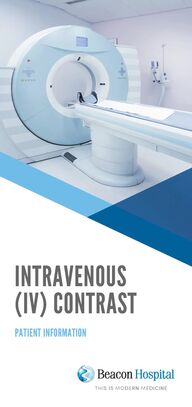
Return to flip book view
Message INTRAVENOUS IV CONTRAST PATIENT INFORMATION THIS IS MODERN MEDICINE
INTRAVENOUS IV CONTRAST PATIENT INFORMATION What Is IV Contrast Used For Intravenous contrast or IV contrast is a substance which when injected helps to show areas of the body more clearly on scans IV contrast may be used during your CT planning appointment to help create your treatment plan What Is Involved Upon your arrival you will be asked to fill out an IV contrast questionnaire This is to make sure you are suitable for the injection and inform you of any possible side e ects You will also need to have a blood test to ensure your body can tolerate the contrast Do not worry if you cannot have the contrast it will not negatively impact your treatment or outcome
What Happens When I Am Having The Contrast Injected A radiation therapist will administer the contrast using a pump You may experience a warm sensation flowing through your body for a few seconds as the contrast travels through Some people experience a metallic taste in their mouth throat Others get a sensation as though they are going to the toilet urinating though they are not It is a sensation which passes in a matter of seconds You should not experience any pain or soreness If you do tell your radiation therapist and they will stop administering the contrast immediately At the end of your appointment your radiation therapist will remove the injection needle and check for any irritation before you leave Are There Any Side E ects The majority of patients receive IV contrast without any problems Although it is unlikely you will experience any of the side e ects listed below it is important that you are aware of them Immediate Side E ects The injection site can be a little tender or itchy for the day This usually settles down a few hours after the injection has been removed
If you experience any warm sensation or swelling at the injection site please let us know or contact your GP A very small percentage of patients may develop a delayed reaction where a rash can develop hours or even days after their scan Though the majority are mild a more severe rash may require medication If you are unsure please call us or your GP Mild Reactions Nausea and vomiting This should settle down quickly Ensure to drink plenty of water and take an anti emetic such as motilium Headache flushing itching mild skin rash or hives can also occur These are all temporary and should settle in a day or two If you experience any of these contact us or your GP immediately Moderate Reactions Severe skin rashes or hives wheezing abnormal heart rhythms high or low blood pressure shortness of breath or di culty breathing If you experience any of these contact us or your GP immediately Severe Reactions Di culty breathing cardiac arrest swelling of the throat or other parts of the body convulsions or very low blood pressure Seek immediate medical help if you experience any of these
Further Information Further information on this and other related topics is readily available from the following resources Irish Cancer Society 43 45 Northumberland Road Dublin 4 Tel 01 231 0500 Fax 01 231 0555 Email helpline irishcancer ie www cancer ie National Cancer Helpline 1800 200 700 Beacon Hospital Cancer Centre Radiotherapy Department Beacon Hospital Sandyford Dublin 18 Tel 01 293 6691 Fax 01 293 6657 In an emergency at the weekend or after hours please call your GP or your closest A E Department
Beacon Hospital Sandyford Dublin 18 D18 AK68 Tel 01 293 6600 www beaconhospital ie Version 2 01 2023